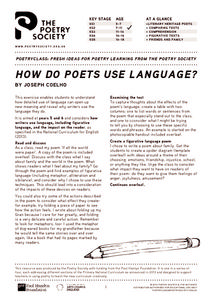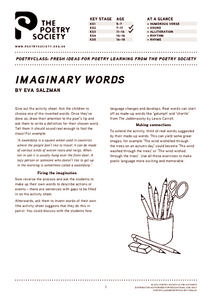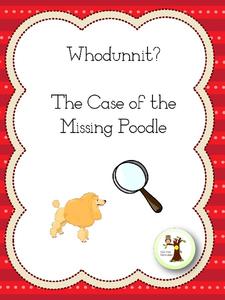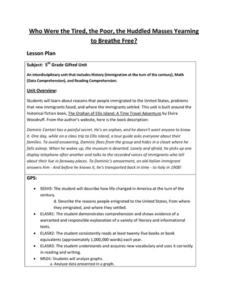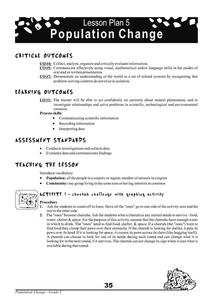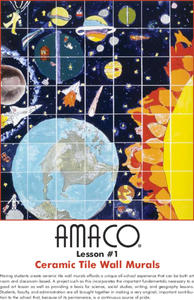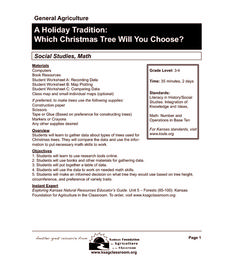Briscoe Center for American History
Mary Maverick and Texas History - Part 1
What's the difference between a diary and a memoir? Young historians explore the ramifications of this question as they learn how to use primary source materials to gain an understanding of life on the Texas frontier.
Briscoe Center for American History
Applying the SOAPS Method of Analyzing Historical Documents
Young historians use the SOAPS (Speaker, Occasion, Audience, Purpose, Subject) method of questioning to determine the historical value of primary source documents. The third in a series of five lessons that model for learners how...
Scholastic
Step-by-Step Strategies for Teaching Expository Writing
A carefully crafted, logically organized, 128-page packet is an excellent addition to your unit on expository writing.
Poetry Class
Eccentricity and Sound
What do Lady Gaga and Dame Edith Sitwell have in common? As they examine Sitwell's poetry, class members learn that the similarities are far more than their unique appearance.
Poetry Society
How do Poets Use Language?
Why do writers choose the language they do? Here's a resource that has the poet himself answer that very question. Joseph Coelho explains why he chose the words and images he used in his poem, "If All the World Were Paper."
Poetry Society
Simile and Metaphor
Young poets use word cards to prompt a metaphor poem comparing to very dissimilar items.
Poetry Society
A Conceit Poem
Young writers needn't be self-involved to craft a conceit. Directions for how to craft this form of extended metaphor, models, and a worksheet are all included in the packet.
Poetry Society
Imaginary Words
Oh, what fun! Young logophiles and neologists create a dictionary-sounding definition for imaginary words and try to fool their classmates.
Tick Tock Curriculum
Whodunnit? The Case of the Missing Poodle
Who purloined the poodle? Class groups read police reports and theorize whodunnit. The sixth of a ten-lesson series on mysteries.
Northeast Georgia Regional Educational Service Agency
Who Were the Tired, the Poor, the Huddled Masses Yearning to Breathe Free?
Elvira Woodruff's The Orphan of Ellis Island: A Time Travel Adventure is the core text in a interdisciplinary unit study of immigration at the turn of the century.
Cheetah Outreach
Population Change
Your youngsters become cheetahs in search of food, water, shelter, and space in a fun physical game that does a fantastic job of representing fluctuating species population based on resources available over years.
HealthTeacher
Get More Sleep
Help learners identify habits that interfere with sleep and to understand the importance of adequate rest and its impact on not only physical health, but also emotional wellbeing.
American Art Clay Co., Inc.
Ceramic Tile Wall Murals
Science, social studies, language arts, and art classes work together with administrators to produce a permanent, ceramic tile wall mural to install at their school.
2012 Teaching Resources
Analyzing Character Traits
Character analysis becomes easy with a 24-page packet packed with mini-lessons, graphic organizers, and activities. A must-have for your curriculum library.
Clark County School District
Owl Moon by Jane Yolen
A thorough lesson plan takes your first grade class through Jane Yolen's beautiful Owl Moon. It crafts the unit with clear objectives, high-level guiding questions, cloze activities and sentence frames, and extension activities at the...
Mary Pope Osborne, Classroom Adventures Program
Dinosaurs Before Dark
Young readers travel back to the time of the dinosaurs in this literature unit based on the story Dinosaurs Before Dark. Intended for use with upper-elementary special education learners, this resource provides reading comprehension,...
Mary Pope Osborne, Classroom Adventures Program
Mummies in the Morning Egyptian pyramids, hieroglyphics
Visit the Magic Treehouse and take your class on a trip through time with a reading of the children's book Mummies in the Morning. Using the story to spark an investigation into Egyptian culture, this literature unit engages...
Mary Pope Osborne, Classroom Adventures Program
Civil War on Sunday
Reading Mary Pope Osborne's Civil War on Sunday? Here's a packet crammed with activities, exercises, reading guides, and project suggestions. A must-have for your curriculum library.
Agriculture in the Classroom
A Holiday Tradition: Which Christmas Tree Will You Choose?
Different varieties of Christmas trees provide an interesting way to combine social studies, science, math, and technology. Class members not only research the history of the Christmas tree holiday tradition, they compare and contrast...
SeaWorld
How Big is a Blue?
Whales are all big, but some are larger than others! Kids will love sorting the 10 whale species by size at their desk (whale cut-outs provided). Next, use a whale rope to visualize how long each of these whales actually is. A large...
University of Victoria
Let's Face It: Picasso
Whether or not you decide to credit Picasso, young cubists will enjoy playing with facial features in an activity that has them creating faces, cutting the images into pieces, and reassembling the pieces into new images.
Brooklyn Children’s Museum
Inside India
What can a Ganesh statue, hand ornament, and print block tell you about India? Introduce your learners to the geography, history, and culture of India by analyzing primary sources and using the well-designed worksheets provided in this...
Forest Foundation
Forests, Carbon & Our Climate
To conclude their examination of forest ecosystems, class members consider the role forests play in the carbon cycle and how forests can offset climate change.
Agriculture in the Classroom
The Garden Chef
Introduce young chefs to nutritious eating with a cookbook that is divided into sections focusing on one of the five food groups. It includes lessons, activities, and recipes. How wholesome!






